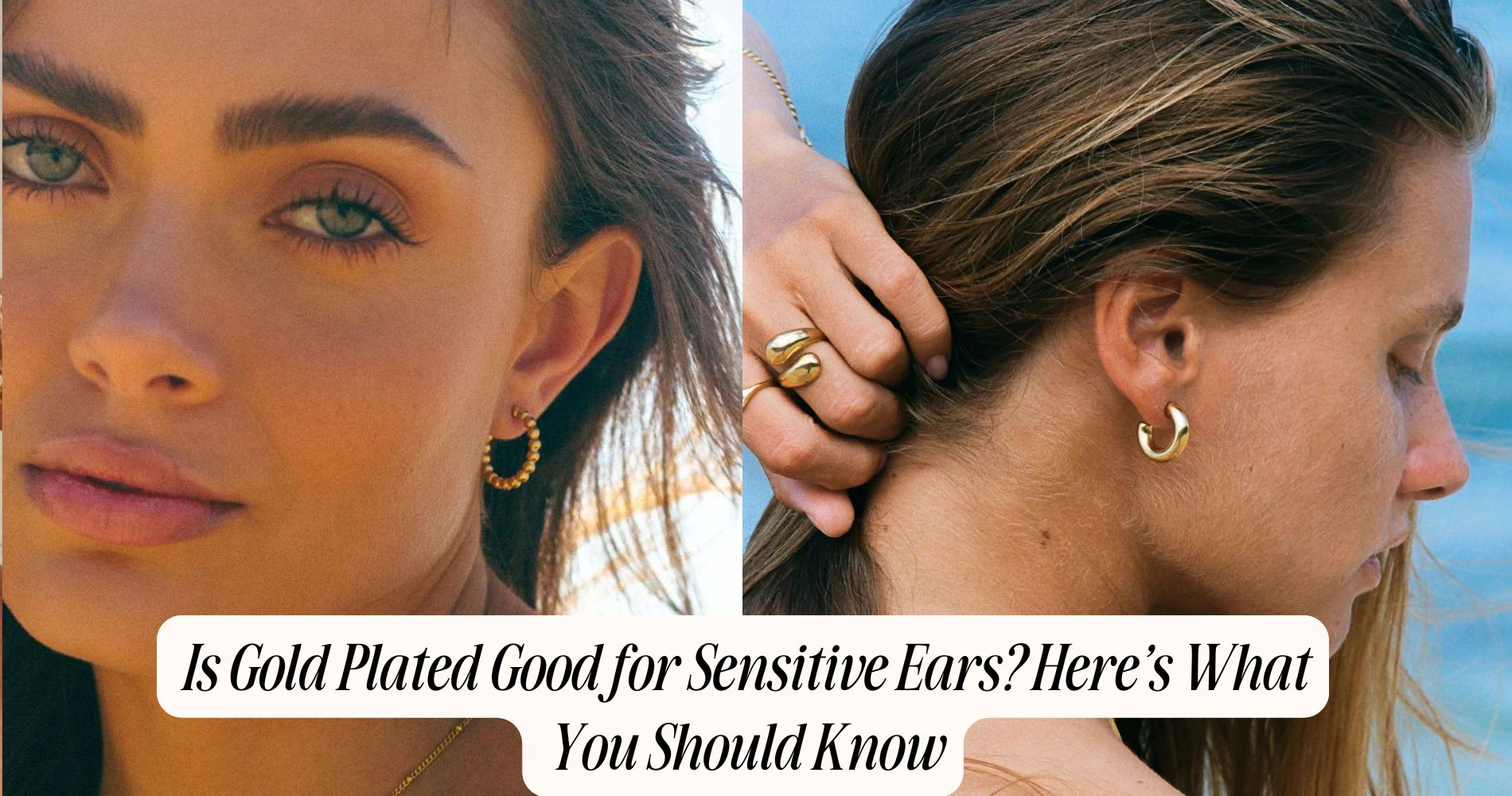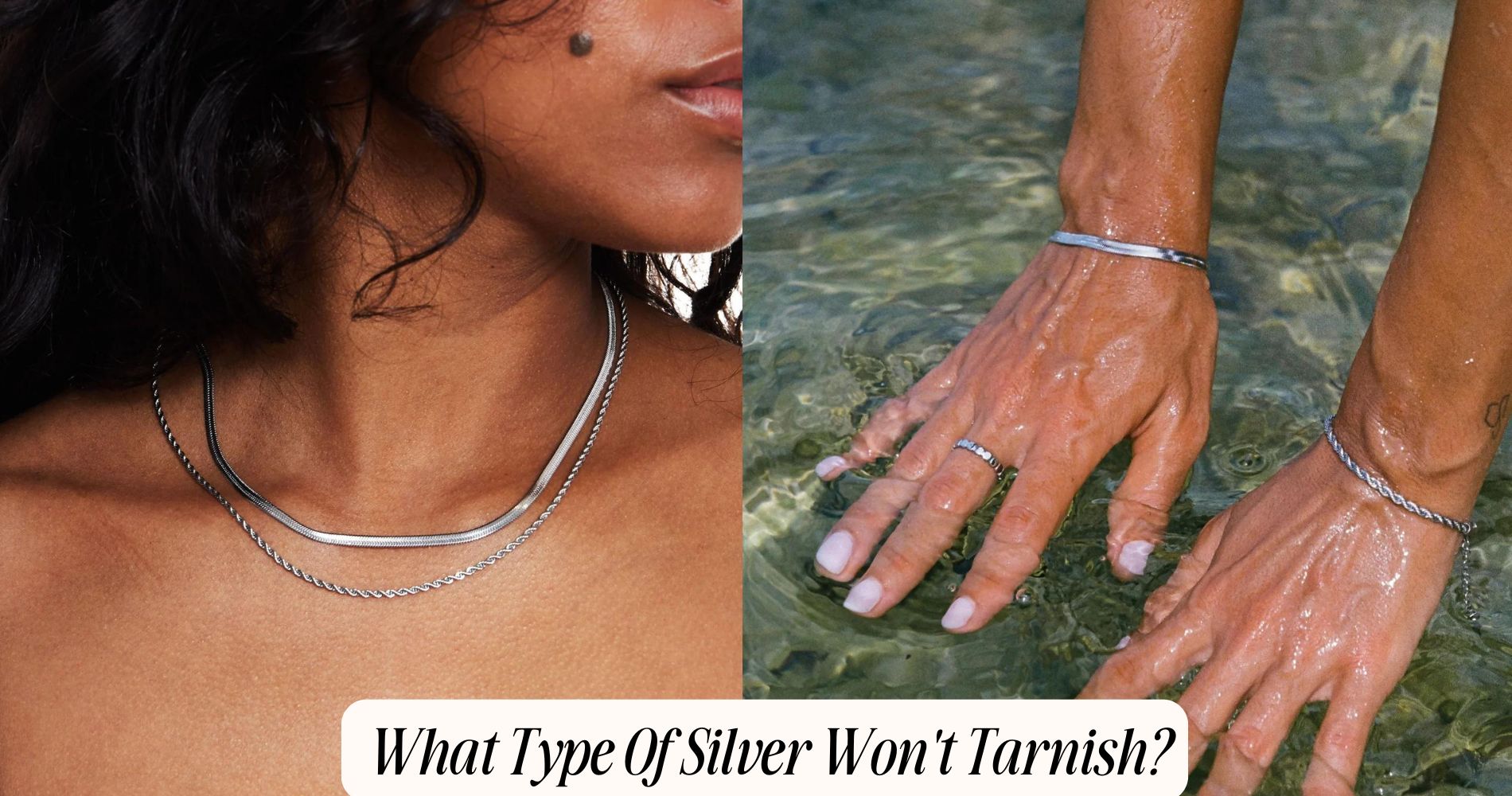
Is Gold Plated Good for Sensitive Ears? Here's What You Should Know
Is gold plated good for sensitive ears? Yes, it can be a great option if you consider a few important factors. Thicker gold plating, ideally at least 0.5 microns, helps reduce allergic reactions by creating a protective barrier against irritants like nickel and copper in the base metal. For added comfort, choose gold-plated earrings made from hypoallergenic materials such as surgical stainless steel. Keep in mind that environmental factors and personal skincare routines can also influence sensitivity. By selecting high-quality pieces and understanding the materials, you can enjoy both comfort and style. Explore our Hypoallergenic Hoop Earrings collection for perfect options designed for sensitive ears.
Understanding Gold Plating
Gold plating is a popular choice for jewelry, especially for those with sensitive ears. This process involves applying a thin layer of gold over a base metal, which can minimize allergic reactions and irritation.
Typically, the gold plating process starts with cleaning the base metal to guarantee proper adhesion. Next, the item is submerged in a gold solution, where an electric current is used to bond the gold to the surface. The thickness of the gold layer can vary, influencing both durability and appearance.
Gold plating applications extend beyond just earrings; you'll find it in necklaces, bracelets, and rings. These plated pieces often offer the luxurious look of solid gold at a fraction of the cost, making them accessible for everyday wear.
Additionally, the gold layer can enhance the aesthetic appeal of various base metals, such as copper or silver, providing a beautiful finish that resists tarnishing.
When choosing gold-plated jewelry, it's important to take into account the thickness of the gold layer, as this impacts longevity and wearability. For sensitive ears, selecting high-quality gold plating can lead to a comfortable and stylish experience without compromising on elegance.
Materials Used in Gold Plating
When exploring gold plating, you'll encounter various types that cater to different needs, including electroplated and hard gold plating.
It's equally important to take into account the base metals used, such as copper and brass, which provide a sturdy foundation for the gold layer.
Understanding these materials helps you choose the right options for sensitive ears and guarantees longevity and comfort in your jewelry.
Types of Gold Plating
In the domain of jewelry design, various materials are utilized for gold plating to achieve both aesthetic appeal and durability. You'll encounter different gold types, such as yellow gold, white gold, and rose gold. Each type offers a unique hue and can greatly impact the overall look of the piece.
The gold plating techniques also vary, with methods like electroplating and gold-fill being the most common. Electroplating involves using electrical currents to deposit a thin layer of gold onto a base metal, while gold-fill consists of a thicker layer of gold mechanically bonded to the base metal, offering greater durability and resistance to wear.
When selecting gold-plated jewelry, it's essential to contemplate the thickness of the gold layer and the type of gold used. Thicker layers are generally more suitable for sensitive ears, as they reduce the likelihood of irritation from the base metal underneath.
Common Base Metals
Choosing the right base metal is essential for guaranteeing the longevity and comfort of gold-plated jewelry. Common base metals used in gold plating include brass, copper, and stainless steel. Each metal has unique properties that can greatly affect your experience with the jewelry.
Brass, a popular choice, is malleable and inexpensive, but it can be prone to base metal corrosion, especially in humid environments. This corrosion can lead to discoloration and may irritate sensitive ears.
Copper also offers good conductivity and durability, but like brass, it can oxidize and tarnish, causing skin reactions for some people.
Stainless steel is often favored for its resistance to corrosion and hypoallergenic properties. It's less likely to cause irritation, making it a safer option for sensitive ears.
When selecting gold-plated jewelry, consider the base metal properties that suit your lifestyle and skin sensitivity.
Ultimately, understanding the base metal used in your gold-plated pieces can help you make informed choices and enhance your jewelry experience.
Always look for quality indicators to guarantee that your jewelry not only looks beautiful but also feels comfortable to wear.
Benefits of Gold-Plated Jewelry
Many people appreciate the benefits of gold-plated jewelry, especially for those with sensitive skin. One of the primary advantages is that gold plating offers the luxurious appearance of solid gold at a fraction of the cost. This makes it a popular choice for fashion trends, allowing you to stay stylish without breaking the bank.
Gold-plated pieces are also versatile, making them ideal for jewelry layering. You can easily mix and match them with other metals and styles, creating a unique look that reflects your personality. The warm hue of gold adds elegance to any outfit, enhancing your overall style.
Moreover, gold-plated jewelry is generally lightweight, which can be more comfortable for extended wear, especially for earrings. You'll find that many gold-plated options come in a variety of designs, from minimalist to statement pieces, ensuring you can find something that suits your taste.
Lastly, with proper care, gold-plated jewelry can maintain its luster for a long time, making it a practical choice for everyday wear.
Potential Allergens in Gold Plating
When considering gold-plated jewelry, it's important to be aware of potential allergens that may cause skin reactions.
Common allergenic metals, such as nickel or copper, can sometimes be present in the underlying layers of gold plating, especially if the plating is thin.
Additionally, individual skin sensitivity factors can vary, making it vital to choose pieces specifically designed for sensitive skin.
Common Allergenic Metals
Gold plating often contains a mix of metals that can trigger allergic reactions in sensitive individuals. One of the most common allergens found in earring materials is nickel, which is often used to enhance the durability and shine of gold plating. If you have a nickel allergy, wearing gold-plated earrings may lead to irritation, redness, or swelling.
Other potential allergens include copper and zinc, which can also be present in gold alloys. These metals mightn't affect everyone, but if you're prone to sensitivities, it's essential to be cautious.
Some individuals may react to the base metal beneath the gold layer, especially if the plating wears off over time.
When shopping for earrings, look for options labeled as "nickel-free" or made from hypoallergenic materials like surgical stainless steel, titanium, or pure gold.
These alternatives are less likely to cause an allergic reaction, providing a safer choice for sensitive ears. Always pay attention to the composition of earring materials to guarantee you're not exposing your skin to potential allergens that could lead to discomfort or irritation.
Gold Plating Thickness
The thickness of gold plating plays an essential role in determining the likelihood of allergic reactions for sensitive individuals. Generally, gold plating standards specify that a minimum thickness of 10 karats is recommended for quality jewelry. This means that the gold layer should be at least 0.5 microns thick to offer sufficient protection against potential allergens found in the base metal beneath.
When it comes to gold thickness measurement, keep in mind that the thicker the gold layer, the less likely you're to experience irritation. A higher thickness not only provides better durability but also enhances the barrier between your skin and the potential irritants, such as nickel or copper.
You may encounter gold-plated jewelry that claims to be hypoallergenic, but if the plating is too thin, the underlying metals can easily react with your skin, leading to discomfort.
Choosing jewelry that adheres to established gold plating standards can greatly reduce the risk of an allergic reaction. Always check the gold thickness measurement before purchasing, as this will help you make an informed choice that prioritizes both style and comfort for your sensitive ears.
Tips for Choosing Gold-Plated Earrings
When selecting gold-plated earrings, it's essential to take into account several key factors to guarantee both comfort and style.
First, pay attention to the earring styles that suit your face shape and personal aesthetic. Whether you prefer hoops, studs, or dangling designs, choose options that complement your features and wardrobe.
Next, consider the thickness of the gold plating. A thicker layer usually means better durability and reduced chances of skin irritation, which is vital for sensitive ears. Look for reputable brands that specify their plating thickness, as this can greatly influence the longevity of the earrings.
Additionally, stay informed about current fashion trends. Opt for gold-plated earrings that not only reflect your personal style but also align with what's in vogue. This way, you can enjoy your earrings while making a fashionable statement.
Lastly, before making a purchase, check for reviews regarding comfort and wearability. This feedback can help you avoid earrings that may cause discomfort.
Caring for Gold-Plated Jewelry
Caring for gold-plated jewelry is vital to maintaining its luster and preventing deterioration over time. To guarantee your pieces stay beautiful, start with proper cleaning techniques. Use a soft, lint-free cloth to gently wipe away dirt and oil after each wear.
For a deeper clean, mix mild soap with warm water, dip a soft cloth into the solution, and gently clean your jewelry. Avoid harsh chemicals or abrasive materials, as they can damage the gold plating.
In addition to regular cleaning, effective storage is essential. Store your gold-plated jewelry in a cool, dry place, preferably in a soft pouch or a jewelry box lined with fabric. This prevents scratches and minimizes exposure to air, which can lead to tarnishing.
Avoid hanging or tossing your jewelry carelessly, as this can cause tangles and damage.
Remember to remove your gold-plated pieces before swimming, showering, or exercising to prevent exposure to moisture and sweat.
Alternatives for Sensitive Ears
For those with sensitive ears, finding comfortable and stylish jewelry can be a challenge. Fortunately, there are several alternatives that can help you avoid irritation while still looking great.
When shopping for earrings, consider hypoallergenic options made from materials like surgical stainless steel, titanium, or niobium. These metals are less likely to cause allergic reactions and provide durability.
In addition to metals, you might explore jewelry crafted from natural materials. For instance, wooden earrings or those made from natural gemstones can be both beautiful and gentle on sensitive skin.
Organic materials, like bamboo or cork, are also excellent choices, offering a unique aesthetic while minimizing the risk of irritation.
You should also look for earrings that feature silicone or plastic backings, as these materials are often softer and gentler against the skin.
Finally, when you're unsure, opt for jewelry labeled as hypoallergenic; this designation typically means the item is free from common irritants, making it a safer choice for your sensitive ears.
With these options, you can enjoy stylish jewelry without compromising comfort.
Frequently Asked Questions
Can Gold-Plated Jewelry Tarnish Over Time?
Yes, gold-plated jewelry can tarnish over time if not properly cared for. To maintain its shine, you should follow gold plating maintenance tips and practice good jewelry care, avoiding moisture and harsh chemicals.
How Long Does Gold Plating Typically Last?
Gold plating typically lasts one to three years, depending on wear and care. For better gold plating durability, follow jewelry maintenance tips like storing pieces properly and avoiding exposure to water, perfumes, and harsh chemicals.
Is There a Difference Between Gold-Plated and Gold-Filled?
Gold-plated jewelry features a thin layer of gold over a base metal, while gold-filled has a thicker layer, ensuring better durability. Proper jewelry care enhances gold quality, making gold-filled options preferable for longevity.
Can Gold Plating Cause Ear Infections?
Gold plating itself doesn't cause ear infections, but allergic reactions or metal sensitivities can arise, leading to irritation. It's essential to know your body's reactions to avoid complications when wearing gold-plated jewelry.
Are There Hypoallergenic Gold Plating Options Available?
Yes, there are hypoallergenic gold plating options available, often made with nickel-free alloys. To guarantee longevity and reduce irritation, you should practice proper jewelry care by cleaning and storing your pieces correctly.
Conclusion
In summary, while gold-plated jewelry can be a stylish choice for many, it's important to take into account your sensitivity to certain materials. Look for high-quality gold plating with minimal alloy metals to reduce the risk of irritation. Always prioritize your comfort by following proper care techniques and monitoring your skin's reaction. If you experience discomfort, explore hypoallergenic alternatives like stainless steel or titanium. Your ears deserve both style and safety, so choose wisely!

























Leave a comment
This site is protected by hCaptcha and the hCaptcha Privacy Policy and Terms of Service apply.